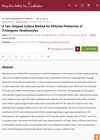 37 citations,
October 2021 in “Nutrients”
37 citations,
October 2021 in “Nutrients” Vitamin D might help regulate insulin in the body, but taking Vitamin D supplements doesn't clearly prevent or improve type 2 diabetes. More research is needed.
35 citations,
January 2011 in “Journal of Biological Chemistry” sPLA2-X is crucial for normal hair growth and follicle health.
33 citations,
January 2018 in “Blood” Ruxolitinib helps protect skin stem cells and keeps skin healthy in mice with skin GVHD.
 31 citations,
August 2021 in “Stem Cell Research & Therapy”
31 citations,
August 2021 in “Stem Cell Research & Therapy” The conclusion is that understanding how hair follicle stem cells live or die is important for maintaining healthy tissue and repairing injuries, and could help treat hair loss, but there are still challenges to overcome.
26 citations,
August 2008 in “Clinical endocrinology” The document concludes that more multidisciplinary research is needed to understand and treat PCOS, a condition that significantly affects women's health and quality of life.
20 citations,
November 2021 in “Frontiers in cell and developmental biology” Skin organoids from stem cells could better mimic real skin but face challenges.
20 citations,
February 2018 in “Cell transplantation” Cinnamomum osmophloeum leaf extract may help treat hair loss by promoting hair growth and increasing hair cell proliferation.
 19 citations,
March 2022 in “International Journal of Environmental Research and Public Health”
19 citations,
March 2022 in “International Journal of Environmental Research and Public Health” Certain brain hormones and chemicals are linked to the development of Polycystic Ovary Syndrome.
 16 citations,
May 2015 in “Tissue Engineering Part C-methods”
16 citations,
May 2015 in “Tissue Engineering Part C-methods” A two-step method was created in 2015 to make more cells that help with hair growth, but they need to be combined with other cells for 4 days to actually form new hair.
 13 citations,
September 2021 in “Current Issues in Molecular Biology”
13 citations,
September 2021 in “Current Issues in Molecular Biology” Dexpanthenol helps human hair follicle cells grow by preventing aging and death, and by supporting growth signals.
13 citations,
May 2021 in “FASEB bioAdvances” Plant-based products can improve hair and skin health without harmful side effects.
 12 citations,
February 2022 in “International Journal of Clinical Practice”
12 citations,
February 2022 in “International Journal of Clinical Practice” Oxidative stress is higher in women with PCOS, especially if they're obese, and it may increase their risk of heart disease.
11 citations,
August 2021 in “Aging” Collagen and TGF-β2 help maintain hair cell shape and youthfulness.
 11 citations,
November 2017 in “Hong Kong Medical Journal”
11 citations,
November 2017 in “Hong Kong Medical Journal” Polycystic ovary syndrome increases the risk of diabetes, heart disease, and endometrial cancer, and requires early treatment to manage these risks.
 11 citations,
April 2013 in “Hormones”
11 citations,
April 2013 in “Hormones” New information suggests that metformin might help more women with PCOS and infertility, not just those with glucose issues.
 6 citations,
December 2022 in “Frontiers in Pharmacology”
6 citations,
December 2022 in “Frontiers in Pharmacology” Quercetin may help improve symptoms of polycystic ovary syndrome.
6 citations,
June 2012 in “PloS one” A new mRNA variant of the SCF gene in sheep skin produces a shorter, different protein.
 5 citations,
October 2022 in “Heliyon”
5 citations,
October 2022 in “Heliyon” Polycystic ovary syndrome, a disorder causing menstrual issues and infertility, can be treated with lifestyle changes, medication, herbal remedies, surgery, and assisted reproductive techniques like artificial insemination and IVF.
 5 citations,
October 2021 in “Journal of Ovarian Research”
5 citations,
October 2021 in “Journal of Ovarian Research” Cinnamon can help manage symptoms of polycystic ovary syndrome, improve menstrual cycles and fertility, and positively affect cholesterol and blood sugar levels, but more research is needed to confirm these effects and find the best dosage.
 5 citations,
March 2017 in “Biomedical and Pharmacology Journal”
5 citations,
March 2017 in “Biomedical and Pharmacology Journal” Certain growth factors significantly affect hair loss in women with telogen effluvium.
 4 citations,
May 2022 in “BMC Women's Health”
4 citations,
May 2022 in “BMC Women's Health” High levels of anti-Müllerian hormone can indicate polycystic ovarian syndrome in women who can have babies.
 3 citations,
May 2023 in “Biomedicines”
3 citations,
May 2023 in “Biomedicines” PCOS causes infertility mainly due to hormonal imbalances, insulin resistance, and chronic inflammation.
 3 citations,
January 2023 in “International Journal of Molecular Sciences”
3 citations,
January 2023 in “International Journal of Molecular Sciences” Heat Shock Proteins are important in the development of Polycystic Ovarian Syndrome and could be targets for new treatments.
 3 citations,
April 2022 in “International Journal of Molecular Sciences”
3 citations,
April 2022 in “International Journal of Molecular Sciences” Scientists turned mouse skin cells into hair-inducing cells using chemicals, which could help treat hair loss.
 3 citations,
August 2020 in “PubMed”
3 citations,
August 2020 in “PubMed” Platelet-rich plasma (PRP) is effective in treating various skin conditions and improving hair density, thickness, and patient satisfaction, with lower relapse rates for Alopecia Areata.
 2 citations,
August 2023 in “Marine drugs”
2 citations,
August 2023 in “Marine drugs” Collagen from tilapia scales may improve hair and skin health by reducing stress and inflammation and encouraging hair growth.
 2 citations,
July 2023 in “International Journal of Molecular Sciences”
2 citations,
July 2023 in “International Journal of Molecular Sciences” BFNB could be a promising treatment for hair growth.
 2 citations,
November 2022 in “Bioscience Reports”
2 citations,
November 2022 in “Bioscience Reports” Polycystic ovary syndrome and iron overload share similar symptoms and can be potentially treated with blood removal, diet changes, and probiotics.
2 citations,
August 2022 in “Middle East Fertility Society Journal” The new rodent model successfully mimics non-lean human PCOS symptoms.
2 citations,
July 2022 in “Journal of the Endocrine Society” Some women with PCOS have rare genetic variants linked to the condition.



















